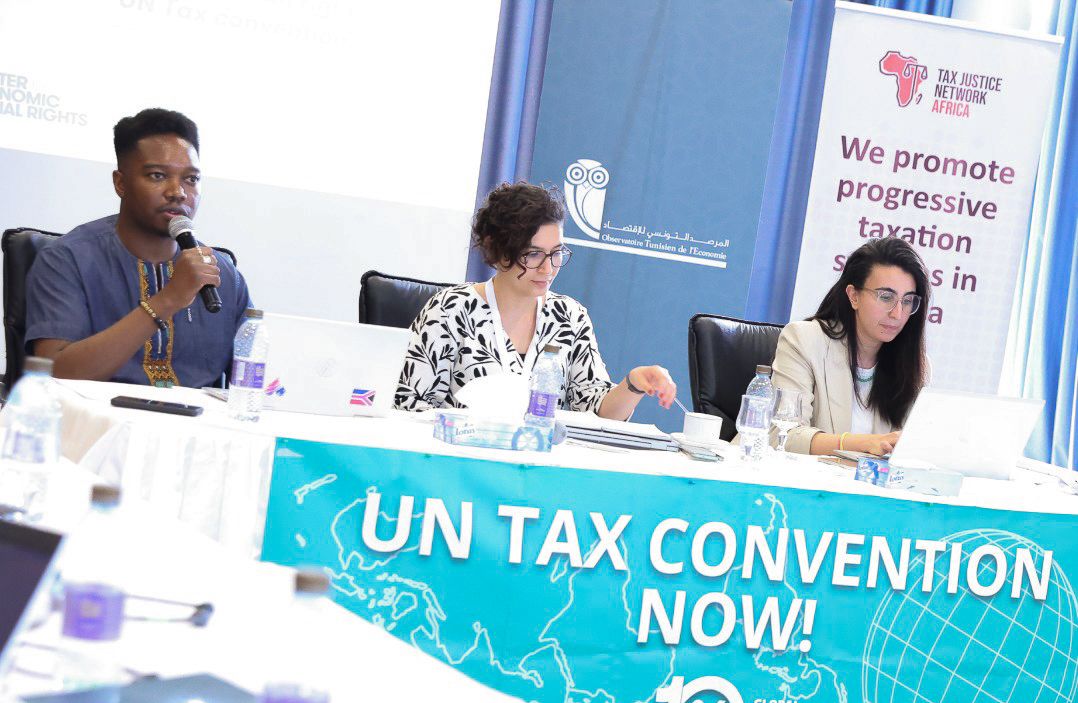Date

Africa’s civil society has committed to rallying behind the Africa Group in the ongoing negotiation for a UN Framework Convention on International Tax Cooperation that responds to Africa’s context. This commitment was an outcome of deliberations that took place at the Regional CSO Conference on Global Tax Reforms on 22 to 24 June 2024 in Tunis, Tunisia. The meeting was held by TJNA in collaboration with the Tunisian Observatory of Economy (OTE).
Participants included representatives of civil society organisations, faith-based organisations, the African Parliamentary Network on IFFs and Taxation (APNIFFT), individual researchers and academics drawn from Tunisia, Senegal, Namibia, Ghana, Kenya, Ivory Coast, South Sudan, Libya, Algeria, Ethiopia, Tanzania, Central African Republic, Liberia, Uganda, Mauritius, Nigeria, Niger, Eritrea, Malawi, South Africa, Zambia, Cameroon and Mozambique, Egypt, Mauritania, Morocco.
In his opening remarks, Mr Felix Otiato, TJNA’s Communications, Campaigns and Outreach Manager, noted that the clamour for global tax reforms seeks to achieve the African aspirations of funding our own development through domestic resource mobilisation rather than debt or overseas development assistance.
He further noted that CSOs have also scored a major point in the progress of the negotiation process of the UN Framework Convention on International Tax Cooperation as they have been allowed to participate during the formal and informal sessions.
“We must continue to be vigilant and safeguard our gains as CSOs in the UN Tax Convention process. Key issues that we advocate for, such as special and differential treatment for African countries, progressive and redistributive tax systems that correct systemic inequalities, including gender and climate change, and adequate tax transparency, have been on the agenda of the substantial negotiating rounds of the new UN Tax Convention process,” Mr Otiato.
The deliberations emphasised that the current global tax rule-setting processes have been undemocratic, tailored to address the economic interests of the Global North to the disadvantage of the Global South. The existing international financial architecture does not promote domestic resource mobilisation for Africa as the current rules do not favour source-based taxation, that is, taxing where the revenue has been derived.
Further, the reforms of the international tax architecture are interlinked with and have implications on the reforms of the climate, debt, trade, and the international financial architecture broadly. Dr Fadhel Kaboub, President of the Global Institute for Sustainable Prosperity, noted that Africa has the potential to become an energy and economic powerhouse, given its critical minerals. He emphasised the need to ensure that the UN Tax Convention addresses structural issues like energy sovereignty, food sovereignty, and industrial policies.
“When we talk about decolonising economic structures, we talk about taxation, international trade, and international financial architecture; these are the components that need to be transformed. So, the UN Tax Convention process is not just about collecting tax revenues but also about transforming the structures that we've been entrapped into,” Dr Fadhel Kaboub.
Participants agreed that the UN Tax Convention provides an opportunity to address perpetual colonial legacies that are highly extractive and facilitate illicit financial flows, consequently impacting human rights by deepening inequalities. This heavily affects marginalised groups, including women, girls, youth, children, racialised communities and other marginalised and impoverished communities.
The CSOs jointly committed to nine key actions through an outcome statement. Download the outcome statement here.
Related resources:
For more details about the conference, please contact fotiato [@] taxjusticeafrica.net.